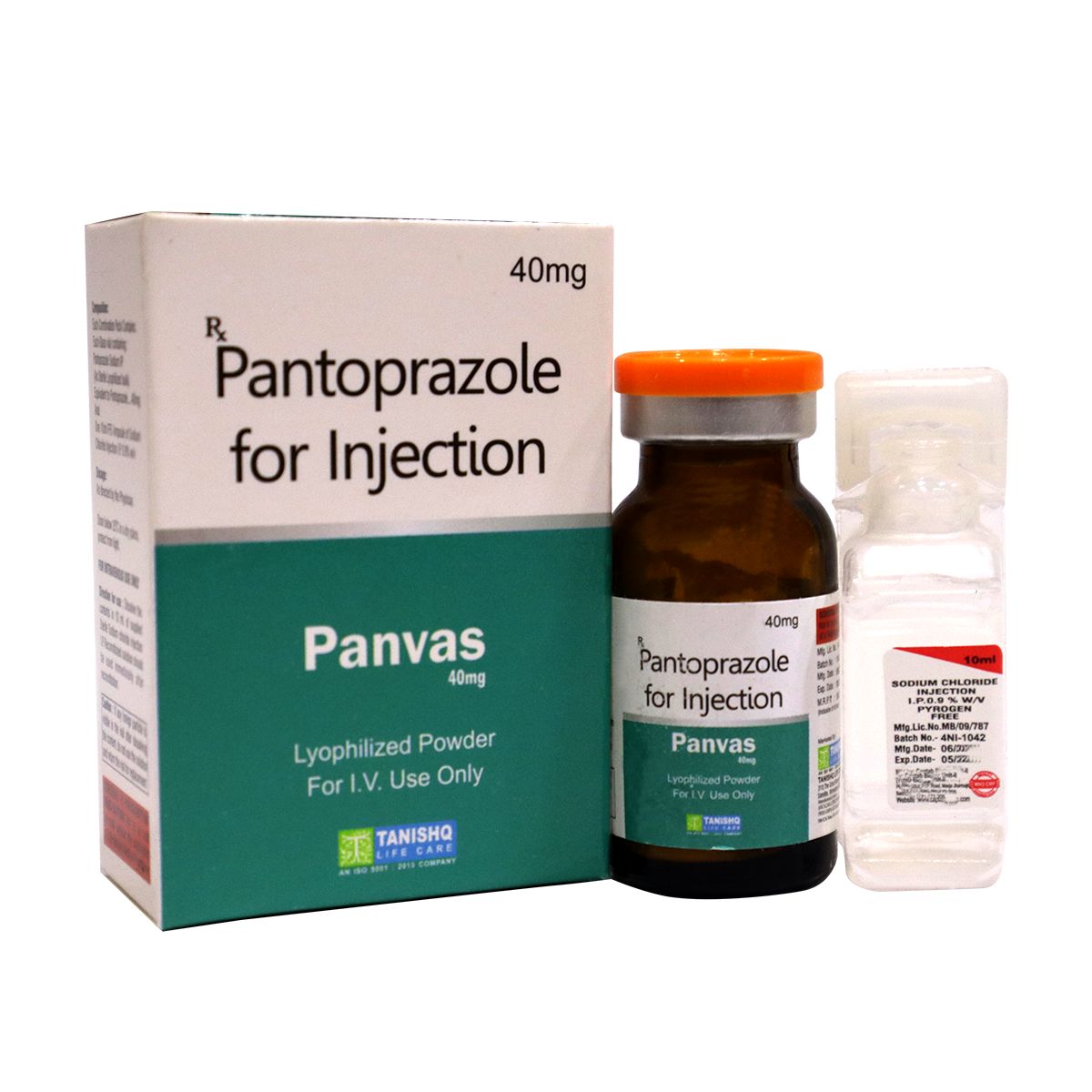
Panvas-40 inj.
PANVAS-40 Inj. is an intravenous (IV) formulation containing Pantoprazole, a proton pump inhibitor (PPI). It is primarily used for the treatment of gastrointestinal conditions related to excessive stomach acid production.
- Recommended Usage
Indications
PANVAS-40 Inj. is used to treat conditions associated with acid overproduction, including:
- Gastroesophageal Reflux Disease (GERD): For the treatment of erosive esophagitis caused by GERD.
- Peptic Ulcers: In the management of peptic ulcers and for the prevention of recurrence.
- Zollinger-Ellison Syndrome: A condition where the stomach produces excess acid.
- Stress Ulcer Prophylaxis: In critically ill patients, especially those in intensive care units (ICU), to prevent stress-related mucosal damage.
Dosage and Administration
Typical Dose for Adults:
- For GERD and Peptic Ulcers: 40 mg administered once daily via IV injection, typically for 7 to 14 days, depending on the condition and response.
- For Zollinger-Ellison Syndrome: The dose may be higher, typically starting at 80 mg per day, divided into 2 doses. Adjustments depend on the patient's response.
- Stress Ulcer Prophylaxis: 40 mg once daily.
Administration:
- IV Infusion: The drug should be administered via slow intravenous infusion, typically over 2 to 15 minutes depending on the clinical condition.
- Dosage Adjustment: For patients with liver impairment, the dose may be reduced, and regular monitoring is recommended.
- Note: Dose adjustments may be needed for elderly patients or those with hepatic impairment.
Precautions
Hypersensitivity: Avoid in patients with a known hypersensitivity to Pantoprazole or any other PPIs.
Severe Hepatic Impairment: Pantoprazole should be used cautiously in patients with severe liver disease; dose adjustments may be required.
Long-Term Use: Long-term use (beyond 8 weeks) should be done under medical supervision, as it may increase the risk of bone fractures, vitamin B12 deficiency, and gastrointestinal infections.
Pregnancy and Breastfeeding: Pantoprazole is classified as Category B for pregnancy, meaning it should be used only when clearly necessary. It is excreted in breast milk, so caution should be used during breastfeeding.
Drug Interactions: Pantoprazole can interact with other medications (e.g., warfarin, methotrexate, or clopidogrel), and dosing may need to be adjusted in these cases.
Benefits
Effective Acid Suppression: Pantoprazole works by inhibiting the proton pump in the stomach, reducing acid secretion and providing relief from symptoms associated with acid reflux and ulcers.
Fast-Acting: Provides rapid relief, especially in patients who need immediate acid suppression, such as those with severe GERD or stress ulcers.
Convenient IV Formulation: The IV route is ideal for patients who are unable to take oral medications or require immediate treatment in a hospital setting.
Minimal Side Effects: Generally well-tolerated with a low incidence of side effects when used as directed.
Short-Term Treatment Option: Useful in short-term management of acute conditions, particularly in hospitalized or critically ill patients.
Product Category
- Anti Infective
- Injectables
- Pre Filled Syringe
- Immunosuppressants
- Anti Ulcerant/ppis
- Joint Care
- Enzymes
- Heamatinic Agents
- Antioxidant Multivitamins
- Laxatives
- Anti Alergic
- Corticosteroids & Combinations
- Anti Fungal
- Medicated Soaps
- Emollients and Moisturisers
- Face Care
- Puva & Sun Protectors
- Hair Care
- Anti Acne Preparation
- Analgesics Antipyretics & Anti Inflammatory
- Anti Spasmodic & Anti Emetic
- Expectorants Antitussives & Mucolytics
- Antidiarrheals
- Cardiac Drugs
- Antipsychotics
- Anti Epileptics
- Migraine
- Anti Dyspetic
